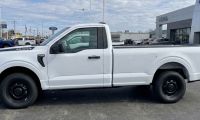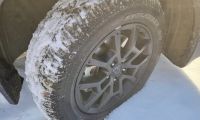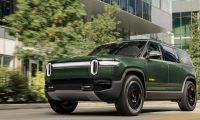Consumer Reports has compiled a list of the top ten cars most likely to go 200,000 miles. It's not a surprise that two Subarus made the top ten list. The 2015 Subaru Legacy sedan and 2014 Subaru Outback wagon. Subarus are known to go this many miles and more, and one thing you’ll notice about their owners, is how long they hang on to them. Like a badge of honor, they watch the odometer to see it roll over the 100,000 mile and then 200,000 mile marks and beyond.
Many Subaru owners consider their car a member of the family and wouldn’t dare get rid of them. With such devoted owners, according to Subaru, 96 percent of all Subaru cars built in the last 12 years are still on the road today. That’s an amazing number when you consider how many older Subarus are still going strong.
Consumer Reports says that iSeeCars.com, the data aggregator, compiled a study based on listings for 30 million vehicles advertised for sale during the last year. Looking at the model years 1981 to 2010, the company ranked those vehicles based on the percentage that achieved the impressive 200,000-mile mark.
Interestingly, the iSeeCars list is made up almost entirely of mainstream sedans, with the only exceptions being the Honda Odyssey minivan and Subaru Outback wagon. They were all family vehicles purchased for everyday use. Notably, all the cars are Japanese models except the Ford Taurus, and no European brands made the list.
Who made the top ten list? Honda Accord, Subaru Legacy, Toyota Avalon, Honda Odyssey, Nissan Maxima, Toyota Camry, Ford Taurus, Honda Civic, Acura TL and Subaru Outback. Toyota and Honda have long been known for their excellent dependability and longevity, but since this is a story about Subaru, we’ll focus on why they have two vehicles on the list, and what sets the brand apart from the competition.
Subaru uses a unique engine design called "the boxer", and it sits at the heart of every Subaru vehicle. The flat laying engine design provides the perfect combination of balance, power and efficiency. The boxer engine name comes from the way the pistons move. In most cars, pistons move up and down. In the boxer engine, the pistons move horizontally, like a boxer punching.
What are the advantages of the boxer design vs inline and V-type engines? The Boxer provides a smooth ride and long lasting dependability. The Subaru Boxer engines' unique design provides less vibration than the competitors design. Each horizontally opposed piston cancels the vibration of the opposite piston. This makes a difference over hundreds of thousands of miles. The pistons in the Boxer engine always stay lubricated which reduces wear and friction compared to “dry starting” Inline and V-type engines. Think of it like a roll-on deodorant where you have to get the ball wet by rolling it before it works. The Subaru Boxer stays lubricated and there is less friction when initially starting the vehicle.
Subaru owners are some of the most loyal automobile owners in the world because they know their car is dependable and they can count on their multi-use vehicle to take them anywhere they want to go. It’s not a surprise that the 2015 Subaru Legacy sedan and 2014 Subaru Outback wagon are in the top ten cars most likely to go 200,000 miles.
Other Subaru Legacy and Outback stories of interest.












Comments
You left out the part about
Permalink
You left out the part about head gasket replacement around the time of the timing belt replacement for around $ 2,000. Only then will the car go for another 100,000.More often than not this is the case.
IMO/IME, head gasket issues
Permalink
In reply to You left out the part about by Tom greaney (not verified)
IMO/IME, head gasket issues were a problem in the past (~< MY 2001) but haven't been a common issue since then (I frequent some of the more popular Subaru forums).
Personally, I have had two Subarus pass 100k without a lot of drama. ....a 2003 WRX and my wife's 2008 Forester which is going on 140k miles. I replaced the timing belt myself on the '08 @ 100k. My only real complaint about these engines are the o-rings for the spark plugs on the valve covers. They tend to weep/leak even before 100k (had it happen on both cars). Not a show stopper but annoying nonetheless.
Hey Tom Greaney, you must be
Permalink
In reply to You left out the part about by Tom greaney (not verified)
Hey Tom Greaney, you must be living in the past buddy because head gaskets haven't been an issue with Subaru since models 2009 and older. Not to mention the fact that there is no timing belt anymore but instead a chain that no longer needs replacing. You might want to do some homework first next time.
Just commenting based upon
Permalink
In reply to Hey Tom Greaney, you must be by Justin Gamache (not verified)
Just commenting based upon experience with a 2001 and a 2006 Outback ( I still drive the 06) . Subaru mechanics are doing more head gasket replacements in the 05 thru 09 models.Consumer Reports validates my claim. The newer models haven't had much of a chance to reach the 100,000 mark yet. I guess we'll see.Nonetheless the Outbacks are wonderful cars and I figure I have many more miles to go unless I opt for the 2015 remake.
As an anecdote, the Phase I
Permalink
In reply to Just commenting based upon by Tom Greaney (not verified)
As an anecdote, the Phase I and II 2.5 are the specific motors with head gasket issues. I had a 2004 Legacy and the head gasket failed at 87K miles and again at 190K at which time I let that car go. I would not purchase a car with that engine again. Never had a single problem with the auto transmission. Other than the head gasket, all other maintenance items in the car were typical for its run (suspension/steering components, brake components). I hope that the new engine does not have head gasket issues.
I drive a lot of miles my
Permalink
In reply to Just commenting based upon by Tom Greaney (not verified)
I drive a lot of miles my 2010 just rolled over 177K. I have not had to do much maintenance on the car other than oil changes, trany flush, tires and brakes. Just changed the spark plugs for the first time. She runs like s champ, trying to decide if I want to driver her from Utah to California then up to San Fran and back home. Little concern about this long of a trip but o think she’ll make it. I am here to say you take care of them they will last. I also just bout a used 2016 3.6 with 31K mikes. Which I don’t want to pilot my trip miles on. We have 4 subies at my house a 2016 outback, a 2008 Impreza, then the 2 legacy’s2010 and 2016. My experience with Nissans and Toyota’s and fords fail in comparison with these subordinate. One would have a hard time convincing me there’s better options!
Really? I had a great mother
Permalink
In reply to Hey Tom Greaney, you must be by Justin Gamache (not verified)
Really? I had a great mother'sday whenmy 2009 Tribeca failed on the highway at 105k miles because the timing chain failure managed to shred the engine! After a stellar maintenance record, this was anything but expected. What was worse wasthe say our dealer treated us. I'm getting ready for warfare.. as a loyal and proud subaru owner, I'm devastated to say the least. Planning on dosaving my mother in law and 2 friends currently considering buying subaru. I'm disgusted.
Head gaskets not an issue on
Permalink
In reply to You left out the part about by Tom greaney (not verified)
Head gaskets not an issue on newer ones, also timing Chain, not belt
New ones have timing chain
Permalink
New ones have timing chain and better head gasket design
As owner of '13 Outback,
Permalink
As owner of '13 Outback, Winter performance is ace. However, they need to improve seat comfort. Refine HVAC modes to push more floor heat & less defrost. Car tracking is also heavily effected by winds.
This article makes no sense.
Permalink
This article makes no sense. It pretends to answer why Subaru Legacy vehicles are more likely to last without ever actually doing so. The author mentions a few facts about the boxer engine - that it reduces vibration, that it sits lower, that it provides better balance - and, as if he'd answered why these vehicles are likely to last, simply states that Subarus are dependable.
Essentially, the article tells you that Subaru Legacy vehicles are likely to last because the author is telling you so. The article says nothing about why they are likely to last at all. Vibration, balance, lower center of gravity - these factors affect performance, not durability.
And why no mention of the recurring head gasket issues these engines experienced in the past, partly due to the poor cooling in the engine? My Subaru Legacy wound up in the junkyard at 165,000 miles precisely because of this issue. But, hey, why dig skeletons when the purpose is to sell Subaru?
As an automotive engineer let
Permalink
In reply to This article makes no sense. by lifeson22 (not verified)
As an automotive engineer let me answer your post. Vibration, in generel, is bad. Look up resonance and bridges. So less vibration does in fact lead to a longer lasting engine.
Also the rods, pistons etc. sit in oil at all times significantly reducing wear during start up, which is when other engine designs see the most wear. Less wear equals a longer lasting engine.
Center of gravity does not factor into the life of the engine.
I agree with Rae on the
Permalink
In reply to As an automotive engineer let by Jae (not verified)
I agree with Rae on the vibration comment. Vibration IS bad, and the back door approach of using balancing shafts has merit, but it means more moving parts that increase weight and complexity.
The part about Subaru boxers keeping the rods, pistons and etc (we don't know what etc means) sit in oil at all times is not true.
When the engine is running, most of the oil is circulating through the lubrication system with perhaps 2 quarts sitting in the oil pan. When the engine is still, the oil pan is full, but the pistons sit above the oil level, with perhaps two of the rod end caps dipped in the oil. If the pistons sat in oil, the oil would seep through the piston rings and into the cylinders, and the tail pipe would surely show a puff of oil smoke on start up.
Just a followup to my
Permalink
Just a followup to my previous message. Tom Greaney mentioned that Subaru mechanics are dealing with more head gasket issues in newer models (05-09), indicating that this issue has not been completely addressed for 05 and later models, as claimed by Subaru. My Subaru Legacy, had head gasket issues at 130,000 miles, was an 07 model—supporting this observation.
I have a 2005 Baja Turbo.
Permalink
I have a 2005 Baja Turbo. Tuned to 300 hp. 200,000 miles. Two timing belts replaced. No head gaskets or any other engine issues. Turbo engines seem to have no head gasket issues. Timing belts are maintenance items.
Love my 2008 turbo Subaru
Permalink
Love my 2008 turbo Subaru Outback. So much so that I paid 3000 for a new transmission, fly wheel and crossbar in 2013. Then, with 108,000 miles on it, I had to have the entire engine rebuilt, for 5100. One month later, my turbo needs to be replaced. I am paying to have it fixed, once again, because I love my Subaru and they don't make the turbo anymore. But not sure my love is well placed. Let's hope it makes it to 200,000 with no more major repairs! Not the experience I was hoping for AT ALL!
...don't know why people can
Permalink
...don't know why people can't read and understand??? The article mentions 2014-15 Subarus which have the updated timing chain and redesigned heads. Yes, older 2.5 engines have issues but that's not what this article is referencing. My '94 Subaru has 265,000 miles and no head gasket issues ever. It is also a non interference motor. Subaru is finally getting back to building extremely long lasting motors in their current cars. Again, not the older 2.5.
My 2011 Outback had a head
Permalink
My 2011 Outback had a head gasket failure at 55k miles. (I now drive a '14 Impreza that has been bulletproof.) But I understand they are talking about newer models here. I'm in the market for larger vehicle and have looked at a '17 Outback. I like the brand, but based on my experience with my 2011 model, I have decided I just can't take a chance on another Outback.
My 2012 Subaru Impreza has
Permalink
My 2012 Subaru Impreza has 59K miles on it, was making a ticking noise while I was traveling long distance, without any warning by check engine light or any other light, it sputtered, check engine light THEN came on and the dealer says it's a broken timing chain. I bought the extended warranty, we are now waiting to hear if they are going to cover this. Anyone have any experience with this? Thank you in advance.
Owner of 2011 Legacy. 146,000
Permalink
Owner of 2011 Legacy. 146,000 miles. Zero problems...ever. Oil changes, tires, brake pads, and 1 set of rotors. That's all I've done to it. I raised 2 human sons and 2 dog sons in this car. Not to mention all the mean things I have done to it. We've been very hard on this car. I may bury it in the backyard and buy a headstone when it quits. Solid as solid gets. Still rides smooth, and everything is in working order.
Your 2011 Legacy is hardly
Permalink
In reply to Owner of 2011 Legacy. 146,000 by Rachel (not verified)
Your 2011 Legacy is hardly old or high mileage by avg standards. You must not know how car spoiled your are. Try a Toyota 4Runner, 1996 at 240k with a new baby on board. The 4 runner has never let me down. Although seatbelts are getting stretched out. But good to hear of the few repairs and lack of issues with the legacy.
I have a 03 and 04 outback
Permalink
I have a 03 and 04 outback both with over 200k,I maintain both of them on a regular basis! Nothing better in the snow in central new York!
And that is the key, don't
Permalink
In reply to I have a 03 and 04 outback by Charlie Laudico (not verified)
And that is the key, don't trust anyone with the repairs and defenetly not the stealer. 230k two timing belts, two coolant exchange and thermostats, two sets of brakes, Two transmission fluid replacement , one set of spark plugs and Nothing else! Even when the shop says it needs something
And that is the key, don't
Permalink
In reply to I have a 03 and 04 outback by Charlie Laudico (not verified)
And that is the key, don't trust anyone with the repairs and defenetly not the stealer. 230k two timing belts, two coolant exchange and thermostats, two sets of brakes, Two transmission fluid replacement , one set of spark plugs and Nothing else! Even when the shop says it needs something